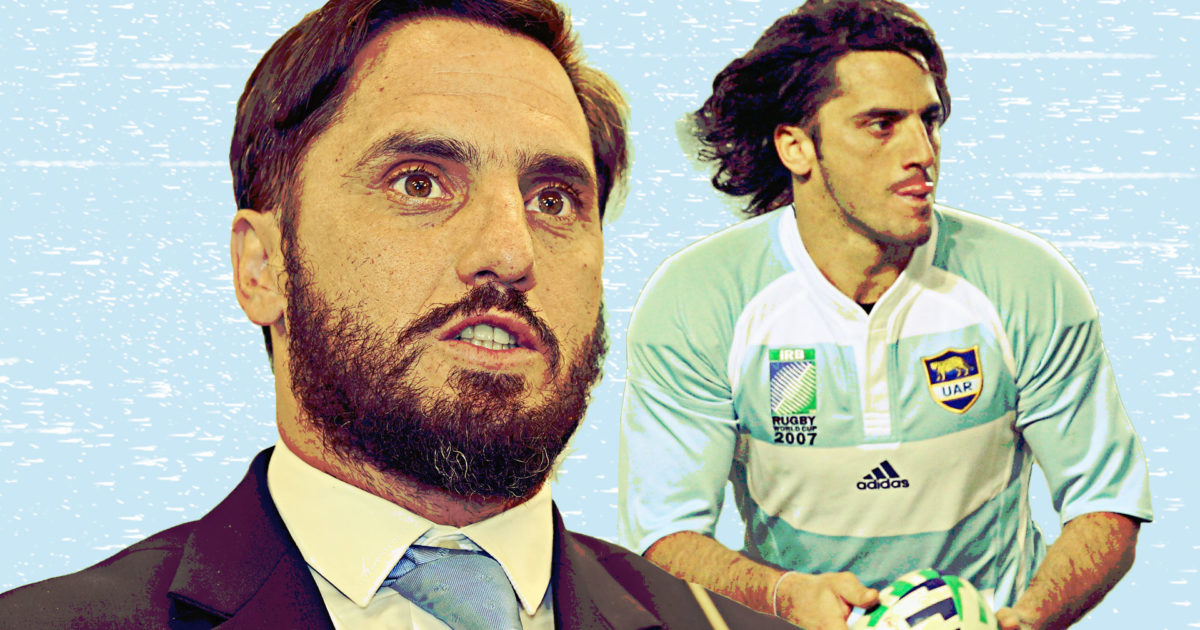Like many of the world’s most influential people, leadership isn’t necessarily something that Agustín Pichot aspired to. Yes, he wanted to make a difference to the rugby world post his playing days, but he certainly never wanted to have his name in the lights.
But that’s the situation the former Argentina captain has found himself in as he mounts a bid to take over as the World Rugby chairman.
Pichot was initially brought into the World Rugby fold in 2016 and was quickly appointed as vice-chairman to Bill Beaumont, the man who he will now be going head-to-head with when the votes are cast in early May.
“When I started in 2016, I spoke to Bernard Lapasset – that was the chairman – and he brought me in,” Pichot told RugbyPass from his home in Argentina.
“He said ‘Gus, why don’t you run with me?’
“I said ‘Bernard, I think we should be more global. We should just look to work with probably a different leader.’”
So it came to be that Pichot and Beaumont teamed up, forging an alliance between the Northern Hemisphere (with Beaumont the former chairman of England’s Rugby Football Union) and the Southern Hemisphere.
Even prior to the coalition, Pichot knew that making any sizeable changes would be difficult, despite Beaumont’s relative progressiveness compared to the older guard.
“Bernard told me ‘you will never get it done’ and Pierre Camou, another French good friend of mine [and former president of the Fédération Française de Rugby] that passed away, unfortunately, he said to me ‘they will never change, they will never want a global game.’”
Still, Pichot helped push through several significant changes during the first two years of his tenure despite the obvious resistance from some of the game’s older stakeholders.
“The first two years were very good and things were going [well], I was pushing [hard],” Pichot said.
“We started to make some more reforms, more investment, be more critical on the management about deadlines, about budgeting – in a modern way, like you’d do a business.
“And then, about a year and a half ago, with the calendar that was proposed as a very important global goal that I pushed very hard, I started receiving some pushback because it was too much.”
The change that Pichot is talking about, of course, is the proposed Nations Championship – a competition that would see the top 24 teams in the world split into two divisions to compete annually for a trophy.
Promotion and relegation were key aspects of the pitch but there was considerable resistance both from within World Rugby and from some of the game’s stakeholders.
“For me, it was just a better tournament: yearly, inclusion of emerging nations, more money for the game, more money for investment in emerging nations, more money for investment in the women’s game – and it didn’t happen.”
That was effectively the last straw for Pichot – which is what has prompted the former halfback to throw his hat into the ring.
“It’s not that I wanted to be chairman, [but] I couldn’t carry on for four more years like that, I had to be true to myself,” Pichot said.
EXCLUSIVE
“It is nothing against Bill, Bernard or the current regime…" @Garygoldrugby is backing @AP9_ and he tells @chrisjonespress why ???https://t.co/TD1r8pb0o4
— RugbyPass (@RugbyPass) April 19, 2020
Which has brought us to the current situation where Pichot is running on his own against Beaumont and his new vice-chairman elect, current FFR president Bernard Laporte.
Whatever unfolds, we’re going to witness one Hemisphere taking broader control – and Pichot is especially concerned at the Beaumont/Laporte combo, given England and France already have significant control over the global game purely due to the financial power held within those two nations.
“Two of the biggest economies in World Rugby leading the way. The powerful people get more power and the emerging nations get less power. [It’s] quite patronising, to be honest – and that’s what everyone felt,” said Pichot.
“Personally, I don’t like it. I come from a small country, rugby-wise. I’m a very proud Argentinian and that’s why I advocate for emerging nations because I truly believe that’s how Argentina grew and that’s how we became a powerful nation – or at least one of the 10 best nations in the world – because we received the vision and inclusion from South Africa first and from New Zealand and then from Australia.
“Nobody had a clear view of Argentina’s potential, nobody knew how much money Argentina would bring to the equation, but it was a good rugby decision.”
Pichot will be hoping that the decision-makers agree with his take on the current situation when the votes are cast at the World Rugby AGM on May 12th.










































































